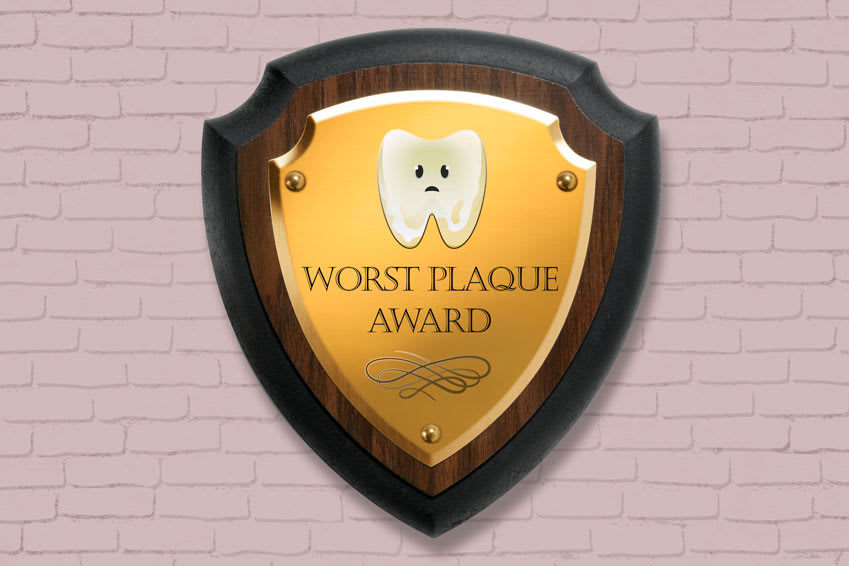You’ve probably know that plaque build-up on your teeth isn’t healthy but have you ever wondered what plaque is and why it’s there?
Dental plaque is a film of bacteria that forms on the teeth and gums. Sticky plaque contains millions of living microorganisms, including bacteria, saliva, food particles, and acids.
When you eat or drink something sugary or starchy, the bacteria in dental plaque begin to produce acid. This acid attacks your tooth enamel for up to 20 minutes after eating or drinking. Over time, this repeated acid attack can cause tooth decay (cavities) and irritate your gums.
The best way to prevent dental plaque from accumulating on your teeth is by brushing twice a day with fluoride toothpaste for at least two minutes each time. You should also remember to clean between your teeth once a day using floss or interdental brushes (tiny brushes that fit in the gaps between your teeth).
Dental Plaque Can Be One of Two Types
Dental plaque may be one of two types: supragingival or subgingival. Supragingival plaque (that’s the kind above the gum line) is easier to remove with regular brushing and flossing than subgingival (below the gums), which often requires help from a dentist.
Both types pose problems if left untreated, as plaque buildup causes tooth decay and gum disease by creating an acidic environment where harmful bacteria can thrive.
Dental Plaque Contributes to Cavities, Too
There are a few common types of cavities, and they all stem from the same issue: dental plaque. While over 500 species of bacteria are in your mouth at any given time, dental plaque typically consists of Streptococcus mutans and Lactobacilli.
The bacteria in your dental plaque secrete acid as they consume sugars from food or beverages you consume. This acid eats away at the enamel and causes tooth decay, also known as cavities or caries.
Dental plaque can also harden into tartar if it’s not removed regularly by brushing or flossing. Because it contains high amounts of oral bacteria, tartar (also called calculus) can cause cavities to grow bigger or form on other teeth in addition to the ones currently affected by dental caries.
Health Risks of Dental Plaque

Gum disease, also known as periodontal disease, is an infection of the gums and tissues surrounding your teeth. It’s usually caused by dental plaque.
If you don’t remove plaque and tartar with regular brushing and flossing, it can build up on your teeth. Your immune system attacks the harmful bacteria in plaque as if it’s a wound or infection. This causes inflammation and gives you swollen, bleeding gums — a condition called gingivitis. Gingivitis can lead to more serious health problems later on, so it’s important to treat it early.
Untreated gum disease can cause problems such as:
- Tooth loss
- Receding gums
- Bone loss around the teeth
- Abscesses (infections) of the mouth
- Increased risk for heart attack or stroke
Because so many potential complications are related to gum disease, removing plaque from your teeth is essential to your health.
What are Risk Factors for Periodontal Disease?
Risk factors for gum disease or periodontal disease include:
- Smoking
- Diabetes
- Poor nutrition
- Stress
- Genetics
- Chemotherapy and radiation therapy for cancer treatment
- Medicines that decrease saliva flow or cause dry mouth (xerostomia)
Saliva washes away bacteria in the mouth and keeps the pH level in the mouth balanced. When saliva flow decreases, bacteria can build up in the mouth more easily. Therefore, some people who take mouth-drying medications get cavities more often than others.
Medicines that may cause dry mouth include those used to treat allergies, asthma, depression, epilepsy (seizures), high blood pressure, Parkinson’s disease, and incontinence (loss of bladder control). The same goes for some painkillers such as morphine-based drugs; muscle relaxants; sedatives; tranquilizers; antidepressants; diuretics; decongestants; antihistamines; antispasmodics; heart medications, and chemotherapy agents.
Steps You Can Take to Prevent Dental Plaque
The best way to prevent dental plaque is to keep up with your oral hygiene and don’t skip your dental visits! Brush your teeth twice a day and floss once a day. This simple routine can help keep dental plaque at bay.
But there’s more. See your dentist too. During these visits, your dentist will remove the extra plaque buildup you missed with brushing and flossing. Your dentist can also examine your teeth for signs of decay or damage and identify potential problems before they get worse.
Other ways to reduce the build-up of dental plaque:
- Visit your dentist regularly
- Brush twice a day
- Floss daily
- Avoid sugary foods and beverages
- Do not drink alcohol or smoke
- Use an electric toothbrush
- Chew sugar-free gum after meals
- Drink water throughout the day
- Use an antimicrobial mouthwash that’s alcohol-free
- Avoid tobacco products
The Bottom Line

Take care of your teeth and gums by reducing plaque build-up at home with regular brushing and flossing. Then, visit your dentist every six months or as often as they recommend to remove dental plaque that home care can’t get rid of.


















